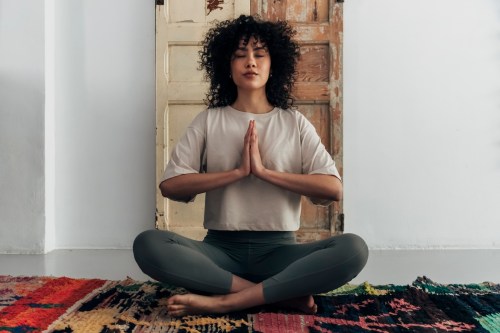Working out has long been talked about as a stress and anxiety management strategy, a way to work through racing thoughts or get a much-needed endorphin boost. Science is clear that working out isn’t only good for your body, it’s good for your mind, too—imperative even. But the connection between exercise and anxiety is far from straightforward.
Experts in This Article
sports psychologist and founder of the Center for Athletic Performance Enhancement
clinical psychologist
psychotherapist and founder of Run Walk Talk
For some people, breaking a sweat doesn’t make them feel relaxed. In fact, it can have the opposite effect, bringing on feelings of anxiety that are hard to put to rest, even once the foam rolling is finished. The anxiety worsened by exercise is enough to make someone want to toss their sneakers into the deep, dark corner of their closet and stop working out for good.
However, given how truly beneficial exercise can be, mental health experts say that ditching your sweat sessions forevermore isn’t always the answer.
Here, therapists who specialize in the connection between exercise and anxiety explain why some people experience workout-induced anxiety and the best ways to overcome it. Because, spoiler alert: It’s absolutely possible to turn working out from something that causes anxiety to something that calms it.
Why some people experience exercise-related anxiety
Let’s back up for a second: What exactly is anxiety? Clinical psychologist Nancy Irwin, PsyD, defines anxiety as a physical and/or mental state during which people experience a sense of impeding doom or dread that “something bad is going to happen.” This feeling is often accompanied by unpleasant symptoms such as rapid heartbeat, shallow breathing, excessive sweating, and racing thoughts.
This is why Sepideh Saremi, LCSW, the founder of Run Walk Talk, which combines a therapy session with running or walking, says people with a history of panic attacks can often feel anxious when exercising. The physical changes that happen to your body while you’re working out—shortness of breath, a fast-beating heart, sweating—mimic the symptoms of anxiety.
“It can start to feel [physically] similar to their panic attacks and take them back to their mindset at that time,” she says.
The same way that our minds retain information about past experiences and what we’ve been through, so too, do our bodies log memories1 of past experiences. There are neural explanations as to why: Just like we have five senses for perceiving the outside world, our internal body has “senses” that help to alert the brain to respond to specific stimuli.
The vestibular system, which is located in the inner ear and brain and helps to modulate movement2, works in close proximity with the limbic system, which controls our body’s autonomic nervous system (aka the body’s fight or flight command center) as well as emotional response, memory, and learning.
When you put the body into “flight” mode to run a few miles or catch a Peloton class with friends, this can cause the mind to pick up the pace with anxious or racing thoughts as well. In many ways, our bodies are biologically programmed to respond to stimuli, and whether there’s a lion chasing us or a Nike Run Club Challenge to conquer, our brains aren’t always fully capable of separating the motion of run from the reality of threat. That’s likely why some studies have found that, in patients3 with a history of panic disorder, exercising caused a spike in anxious thoughts.
Fears of physical limitations, too, can cause anxiety to spike. If someone has heard of a loved one, or someone in the news, experiencing a heart attack or another health problem while exercising, it can cause a fear of that happening to them as well. As soon as their own heart rate starts to increase, they can become preoccupied with the worry that it’s a sign of a heart attack.
Sports psychologist Julie Elion, founder of the Center for Athletic Performance Enhancement, also says if someone has experienced a health issue while exercising in the past or if they simply have a pre-existing condition, they can become consumed with worry that working out may backfire.
“It’s something I hear quite often from people who are over 50—or even 40—and have concerns about heart health,” she says. This is why her very first piece of advice is to get a check-up from a doctor, getting the all-clear before working out. “This will provide peace of mind that you don’t have any health issues and you’re physically able to withstand exercise,” Elion says.
“While physical exercise is no guarantee to erase anxiety or any other unpleasant state, it can certainly decrease it to some degree, allowing one’s creativity and more positive mood/attitude to resolve issues.” —Nancy Irwin, PsyD
What to do if anxious thoughts occur during workouts
It’s clear that exercise and mental health affect one another. “What we do to our bodies, we do to our minds,” Dr. Irwin says. For most people, exercise is a net positive. Getting your sweat on increases serotonin naturally, she says, adding that it also raises dopamine and noradrenaline, all of which are mood lifters. “Maintaining even minimal physical fitness, such as power walking three times a week for 30 minutes, has a positive effect on the brain,” she says.
And does exercise reduce anxiety in particular? The short answer: It absolutely can. There is a clear connection between exercise and anxiety relief since the endorphins released when you physically challenge yourself are known to decrease anxiety, Dr. Irwin says. The longer explanation: “While physical exercise is no guarantee to erase anxiety or any other unpleasant state, it can certainly decrease it to some degree, allowing one’s creativity and more positive mood/attitude to resolve issues,” Dr. Irwin explains.
If you’re experiencing the opposite effect, and find that working up a sweat causes more anxiety than it resolves, here are five steps you can take:
1. Consult with a pro to find the deeper root cause
No advice can ever take the place of a mental health expert who knows your exact experience, so if you’re feeling anxious, make sure to consult with a licensed professional first and foremost to get to the root of your stress and anxiety triggers during workouts. There’s no simple fix to relax the mind; however, coping with anxiety during workouts is possible—we promise.
Saremi emphasizes that finding the core reasons for your anxiety is the most important step in balancing mental health and fitness. While distracting your mind with music or a podcast can be a “really great short-term strategy,” she says, “If it’s a recurring problem, it’s not necessarily going to help you actually face the problem and learn to cope with it.” Yep, that means you might want to book yourself some therapist time—even virtually.
2. Find a workout buddy
Working out with a friend can also be helpful. If something does go wrong, or you start to feel anxious, you won’t be alone.
“Running [or working out] with someone that you feel comfortable with and that if you do start to panic they feel okay being there for you can be really powerful,” Saremi says.
Plus, working out with a friend is also a way to turn anxiety into excitement when you’re looking forward to spending time with them.
3. Try lower-impact workouts
You also might be able to curb your feelings of anxiety by switching up your workout. “If the feeling of your heart starting to beat faster makes you feel anxious, try lower-impact workouts instead,” Elion says. “Movement is really key for managing anxiety but it doesn’t have to be high-impact. Exercises like yoga or Pilates can be incredibly beneficial for both physical and mental health.”
Saremi says that many of her clients who struggle with anxiety are overachievers and often they put pressure on themselves to go above and beyond with their workouts, too.
“Something I often have to train them out of is the thinking that a workout ‘doesn’t count’ if they walk instead of run or they don’t go a certain pace,” she says. “You get to decide what works for you.” What’s more, experts say that something low-key may be the best type of exercise for your mental health.
4. Gradually increase the intensity level
Once you start to feel okay working out at a less intense level, Elion says you can increase it slowly by practicing mindful exercising for anxiety. Saremi recommends this, too, and says you don’t have to “push through” feeling anxious in an effort to prove to yourself that you’re okay. In fact, she recommends not doing this.
“If you start feeling anxious, slow down to bring your heart rate down,” she says. Other anxiety reduction techniques include using meditation apps and trying somatic exercise.
5. Do a grounding exercise
Saremi also recommends a grounding exercise to try in the moment if you get anxious while working out: Notice five things you can see, four things you can feel, three things you can smell, two things you can hear, and one thing you can taste.
When incorporating your senses into your exercise, you can re-train the body to respond to fitness in a more calming and stress-relieving way. “This brings yourself back to the present moment,” she says. In doing so, you’ll realize that you are okay, you are safe.
FAQ
When is the best time to exercise for anxiety?
To get ahead of anxiety, add morning exercise to your routine. “Testosterone is higher then in both genders, and so those early morning ruminating anxious thoughts can be quite strong then,” Dr. Irwin says. “Morning exercise can combat that.”
Start your day off with some low-key stretching to fight a.m. anxiety:
Is exercise better than antidepressants for anxiety?
Some people like to say that their fitness regimen is their therapy. But exercise is not a cure-all for mental health problems. In cases of chronic anxiety disorders, antidepressants can be helpful, Dr. Irwin says, but advises checking with your medical provider since this is an individual choice.
How long does it take for exercise to help with anxiety?
The benefits of an exercise regimen for anxiety are typically immediate, Dr. Irwin says. So you’ll start to feel better right away. That said, exercise is only one component of managing anxiety. “Thought management is crucial for diffusing the power of anxiety in conjunction with exercise, proper nutrition, a positive support system, self-care, and good ‘ol fun,” Dr. Irwin adds.
What are the best types of exercise for reducing anxiety?
There is no one-size-fits-all all approach when it comes to anxiety and fitness. The best type of exercise for you to combat anxiety is the one that you enjoy doing, Dr. Irwin says. Whether that’s yoga, Pilates, ballet, dancing, playing sports, running, swimming, biking, or weight lifting, it can all be beneficial exercise for anxiety.
Riva, Giuseppe. “The neuroscience of body memory: From the self through the space to the others.” Cortex; a journal devoted to the study of the nervous system and behavior vol. 104 (2018): 241-260. doi:10.1016/j.cortex.2017.07.013
↩︎Rajagopalan, Archana et al. “Understanding the links between vestibular and limbic systems regulating emotions.” Journal of natural science, biology, and medicine vol. 8,1 (2017): 11-15. doi:10.4103/0976-9668.198350
↩︎Lattari, Eduardo et al. “Effects of Aerobic Exercise on Anxiety Symptoms and Cortical Activity in Patients with Panic Disorder: A Pilot Study.” Clinical practice and epidemiology in mental health : CP & EMH vol. 14 11-25. 21 Feb. 2018, doi:10.2174/1745017901814010011
↩︎
Sign Up for Our Daily Newsletter
Get all the latest in wellness, trends, food, fitness, beauty, and more delivered right to your inbox.
Got it, you've been added to our email list.











